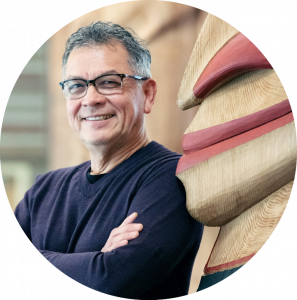
Eduardo Jovel, an Indigenous scholar, is a Mayan-Pipil descendant whose traditional name is Itz Cohuatl. He is an Associate Professor and Director of the Indigenous Research Partnerships in the UBC Faculty of Land & Food Systems. As founder and Director of xwc̓ic̓əsəm Garden at UBC Farm, Eduardo has been actively engaged in building Indigenous land-based research and education environments and works towards restoring community leadership and self-determination. Eduardo’s academic training includes Ethnobotany, Mycology, and Natural Products Chemistry. His research involves Indigenous people’s worldviews and the role of Indigenous knowledges, particularly plant uses and medical practices and ceremonies, on Indigenous people’s health and wellness. Eduardo explores the intersections between gender, research ethics, Indigenous food sovereignty, and culturally respectful mobilization of Indigenous knowledge. Eduardo aims to integrate interdisciplinary research practices, Indigenous knowledges, and biocultural diversity to support Indigenous resurgence, education, and research. Eduardo has worked with Indigenous people in Peru, Ecuador, the United States, New Zealand, Mexico, and Canada. For the xwc̓ic̓əsəm Garden project, Eduardo serves as Principal Investigator.
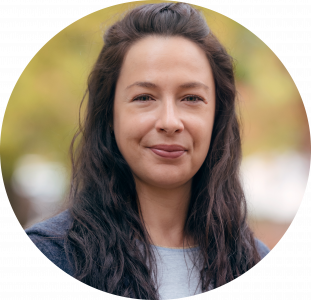
Tabitha Robin Martens is a mixed ancestry Métis and Cree researcher, educator, and writer. She is an Assistant Professor in the UBC Faculty of Land & Food Systems, Applied Biology program. Tabitha’s research explores the processes and practices of Indigenous food systems. She is particularly interested in the factors that impede Indigenous peoples’ food sovereignty. For the xwc̓ic̓əsəm Garden project, Tabitha serves as co-investigator.
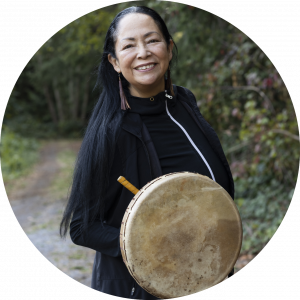
Alannah Young is Anishnabe Midekway and Nehiy/naw Cree from Treaty One and Treaty Five territories and lives in unceded Salish territories. She works with the Indigenous Medicine Collective in partnership with local Indigenous Elders – Jeri Sparrow, and other Indigenous Knowledge holders living in the Lower Mainland. The Medicine Collective is a group of knowledge holders, academics, and researchers who teach Indigenous land-based knowledge to the community, youth, and students. This work primarily takes place at xʷc̓ic̓əsəm, ‘the place where we grow,’ also known as the Indigenous Health Research & Education Garden, located at UBC Farm. Alannah’s doctoral work documented Indigenous Elders’ pedagogy in land-based health education programs in rural Manitoba and, together with the Medicine Collective team, mobilizes the pedagogy for the urban context. For the xwc̓ic̓əsəm Garden project, Alannah serves as the Indigenous Community Liaison through her role as a Senior Research Associate at UBC.
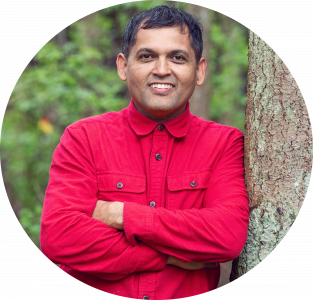
Wilson Mendes is a mixed ancestry Terena, Guarani-Kaiowa and Mozambican land-based researcher, educator, visual artist, and community planner. For the past decade, he has lived on the occupied unceded lands and waters of the hən̓q̓əmin̓əm̓ speaking xʷməθkʷəy̓əm (Musqueam) People. Wilson is a sessional lecturer in the UBC Faculty of Land & Food Systems and the UBC Indigenous Land-Based Health, Wellness, Research, and Education Cluster Coordinator. His research focuses on promoting Indigenous cultural revitalization through intergenerational land-based education. In his doctoral research, he examined the impact of Indigenous land-based education on supporting the wholistic health, healing, and cultural identity of urban Indigenous youth. Wilson prioritizes decolonization efforts that enhance the health and well-being of urban Indigenous communities through meaningful engagement with land, food, culture, and community. For the xwc̓ic̓əsəm Garden project, Wilson is the Garden Research and Education Advisor.
We are saddened to share that Dr. Wilson Mendes passed away on May 30, 2023. We welcome you to honor his life and legacy by visiting https://www.facebook.com/groups/fortheloveofwilson/ – click on Featured to view tangible ways to support the family.
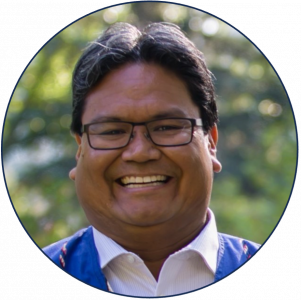 Simon Ross is a Nlaka’pamux member with 20+ years of experience in post-secondary education, non-profit work, healthcare, and Indigenous development. His multidisciplinary interests span community health, career development, leadership training, adventure tourism, and environmental development. Simon has worked extensively throughout Western Canada, Hong Kong and the UK, where he led corporate wilderness training and personal development programs. Throughout his career, Simon has stood at the forefront of developing meaningful connections and has built a reputation as a catalyst in championing the empowerment of individuals and communities. As a senior health program advisor, he partnered with healthcare providers to better understand the diverse needs of First Nation communities in planning quality programs and services. In the areas of education and career development, Simon worked as liaison between Indigenous workers and future employers; and initiated culturally based Indigenous and non-Indigenous skills and leadership training programs. He provided operational leadership in funding; program advancement; strategic planning; board governance; and community and governmental relations. Simon is the Director of Indigenous Leadership at Banff Centre for Arts and Creativity, and Senior Community Wellness Specialist at Impact Resolutions Ltd. For the xwc̓ic̓əsəm Garden project, Simon is the UBC Research and Cultural Advisor.
Simon Ross is a Nlaka’pamux member with 20+ years of experience in post-secondary education, non-profit work, healthcare, and Indigenous development. His multidisciplinary interests span community health, career development, leadership training, adventure tourism, and environmental development. Simon has worked extensively throughout Western Canada, Hong Kong and the UK, where he led corporate wilderness training and personal development programs. Throughout his career, Simon has stood at the forefront of developing meaningful connections and has built a reputation as a catalyst in championing the empowerment of individuals and communities. As a senior health program advisor, he partnered with healthcare providers to better understand the diverse needs of First Nation communities in planning quality programs and services. In the areas of education and career development, Simon worked as liaison between Indigenous workers and future employers; and initiated culturally based Indigenous and non-Indigenous skills and leadership training programs. He provided operational leadership in funding; program advancement; strategic planning; board governance; and community and governmental relations. Simon is the Director of Indigenous Leadership at Banff Centre for Arts and Creativity, and Senior Community Wellness Specialist at Impact Resolutions Ltd. For the xwc̓ic̓əsəm Garden project, Simon is the UBC Research and Cultural Advisor.
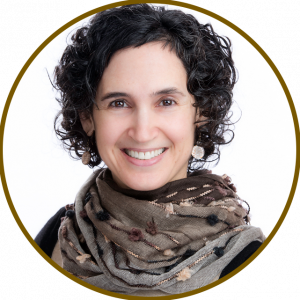
Tanya Wahbe belongs to the Shouf Muwahideen people from the mountains of Lebanon. Since 1994, she has lived in the ancestral and unceded Coast Salish Territories of the Musqueam, Squamish, and Tsleil-Waututh Nations. Tanya is an ecological and cultural resource management professional who has contributed to the conservation of species- and ecosystems-at-risk and Indigenous community-based health initiatives for 25+ years. She is a UBC Adjunct Professor in the Faculty of Land and Food Systems and Senior Indigenous and Conservation Programs Specialist at Impact Resolutions Ltd. Tanya’s conservation research, education, and engagement projects have taken her to Perú, the Dominican Republic, New Zealand, Lebanon, and Ecuador. In BC, she has collaboratively managed ecologically and culturally significant landscapes, developed co-governance frameworks, and engaged with Indigenous communities in Haida Gwaii, the West Chilcotin, Clayoquot Sound, the Central Coast, and the Salish Sea. Tanya’s responsibility to and reciprocity for the people of these lands are reflected in her service, including her support of Indigenous Peoples in conservation and cultural revitalization initiatives. For the xwc̓ic̓əsəm project, she serves as project manager.

Cameron Swinton is a finance and risk specialist with 5 + experience developing financial feasibility, socioeconomic, labour market, operational and enterprise risk management strategies on behalf of multilateral development banks, First Nations communities, local governments, businesses, and non-profit organizations. He holds a Bachelor of Business Administration in international business, a Master’s degree in finance and has obtained the Canadian Risk Management (CRM) Designation. Cameron is an experienced researcher and analyst with a proven ability in collecting, consolidating, and analyzing complex sets of qualitative and quantitative data to facilitate strategic planning and long-term sustainable data-driven decision-making through the application of statistical analyses and modelling techniques. He has demonstrated effective project execution through his leadership and professionalism in non-profit organizational capacity building and performance assurance standards projects. For the xwc̓ic̓əsəm Garden project, Cameron’s role includes literature reviews, data analyses, summarizing data, and supporting the best practices report and briefings to Parks Canada.
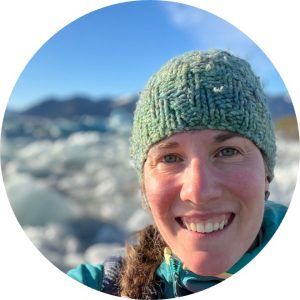 Jocelyn Wood is the Stewardship and Conservation Planning Specialist with Impact Resolutions Ltd. As a settler on the beautiful traditional and unceded territory of the lək̓ʷəŋən, Songhees, Esquimalt and W̱SÁNEĆ peoples, she acknowledges her responsibilities to unlearn misinformation, relearn truths, and support meaningful reconciliation through her work and life as a Canadian. She has been working with environmental non-profit organizations and governments protecting and stewarding public and private conservation lands along the west coast of Canada over the last 10 years. Jocelyn’s work has involved the development and implementation of local and regional conservation plans using the Open Standards for the Practices of Conservation and Miradi software following the adaptive management approach. She has experience coordinating and overseeing monitoring, research and restoration projects to maintain and enhance conservation lands. Jocelyn’s experience in the non-profit sector offered the opportunity to build relationships with partners in government, Indigenous communities, landowners, donors and the public. Jocelyn sought to enhance conservation awareness on the west coast through outreach events, workshops and the development of communication materials. As a scientific writer, Jocelyn has collected, synthesized and collated technical and scientific information, evaluated data and provided recommendations in the study of microplastic ingestion in seabirds and waterfowl habitat conservation in Canada. For the xwc̓ic̓əsəm Garden project, Jocelyn is responsible for writing the best practices report, including lessons learned and recommendations for Parks Canada.
Jocelyn Wood is the Stewardship and Conservation Planning Specialist with Impact Resolutions Ltd. As a settler on the beautiful traditional and unceded territory of the lək̓ʷəŋən, Songhees, Esquimalt and W̱SÁNEĆ peoples, she acknowledges her responsibilities to unlearn misinformation, relearn truths, and support meaningful reconciliation through her work and life as a Canadian. She has been working with environmental non-profit organizations and governments protecting and stewarding public and private conservation lands along the west coast of Canada over the last 10 years. Jocelyn’s work has involved the development and implementation of local and regional conservation plans using the Open Standards for the Practices of Conservation and Miradi software following the adaptive management approach. She has experience coordinating and overseeing monitoring, research and restoration projects to maintain and enhance conservation lands. Jocelyn’s experience in the non-profit sector offered the opportunity to build relationships with partners in government, Indigenous communities, landowners, donors and the public. Jocelyn sought to enhance conservation awareness on the west coast through outreach events, workshops and the development of communication materials. As a scientific writer, Jocelyn has collected, synthesized and collated technical and scientific information, evaluated data and provided recommendations in the study of microplastic ingestion in seabirds and waterfowl habitat conservation in Canada. For the xwc̓ic̓əsəm Garden project, Jocelyn is responsible for writing the best practices report, including lessons learned and recommendations for Parks Canada.
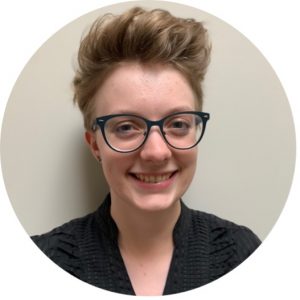
Josie Kaip is an Information & Creative Design Specialist at Impact Resolutions Ltd, and Marketing Assistant at Rosebud Theatre & School of the Arts. She is trained in visual communications and creative design. Josie received her bachelor’s degree in information design from Mount Royal University, where she designed numerous print and digital projects with a focus on rendering complex information more understandable through data visualization. Later on, Josie returned to Mount Royal to work in their Maker Studio. There, she worked on a research project where she cultivated data to assess the successes and impact of the Maker Studio on students. This focus on means of fabrication and 3D design thinking is also leading her to pursue further drafting certificates. Josie went on to obtain a master’s degree in architecture at the University of Calgary. She developed conceptual designs meant to engage with targeted users and interact with their surrounding built environment. Her program gave her the opportunity to study abroad in Tokyo for a semester. While there, Josie engaged in the immersive studio experience, which required in-depth research and planning to propose a conceptual building design within a chosen location. Josie’s experiences have given her an interest in ethical, sustainable design. She is interested in the versatility of information storytelling through different mediums. For the xwc̓ic̓əsəm Garden project, Josie’s role is to creatively design the final report and briefings.
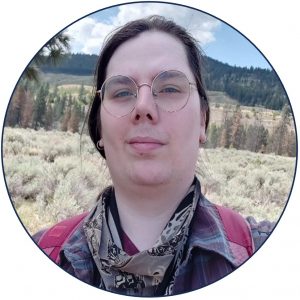
Coraline Thomas is a Two-Spirit member of the Michel First Nation, which is situated on Treaty Seven territory, but was born and raised in diaspora on WSANEC lands now called Victoria. They are an early career scholar on Two-Spirit land connections, and completed their undergrad with a focus on decolonial developmental psychology and queer indigenous thought. They now are a guest on Musqueam lands upon which UBC sits, where they further their education in Gender, Race, Sexuality, and Social Justice, and work as a TA and research coordinator at xʷc̓ic̓əsəm garden.
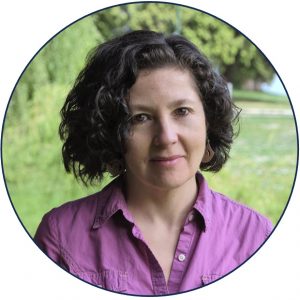
Claudia Páez-Varas (she, her, hers) is a mestiza settler of Indigenous and European ancestry, originally from the territories of Kolla, Atacameño and Chango peoples in northern Chile. Claudia holds a degree in Social Communications (UDP, Chile), a diploma in Film (VFS, Canada) and MSc in Integrated Studies in Land and Food Systems (UBC, Canada). During her graduate studies, Claudia conducted research under the supervision of Dr. Eduardo Jovel focused on gender decision–making, food systems and food security in Quechua communities in the Andes highlands. Claudia has extensive experience working as a researcher and research coordinator. Among her topics of interest are Indigenous food systems, gender decision–making, and campus and school food procurement. Claudia is supporting project coordination and research implementation for the xwc̓ic̓əsəm Garden project.
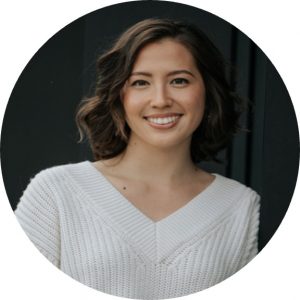
Coral Choi is South Korean, Irish, and Métis. This year she will be finishing her Bachelor of Science in Food, Nutrition and Health in the UBC Faculty of Land & Food Systems, and in September, she will begin the 11-month Teacher Education Program at UBC. During this past winter semester, Coral has completed and was fully engaged in projects such as ‘Indigenous Health and Nutrition Consulting’ and ‘Give Peas a Chance’ for her FNH 473 and LFS 350 courses, respectively. Also, during her past winter semester, Coral had the exciting opportunity of working on the ‘Food Care Project’ with Dr. Jennifer Black and the Food Care Project team thanks to being accepted into the Indigenous Undergraduate Research Mentorship Program (IURMP). In addition to her full–time studies, Coral works as a lifeguard at the UBC Aquatic Centre, volunteers at an elementary school, and has worked as a wildfire firefighter and a dispatcher for BC’s Wildfire Service the past five summers. During the last two years of her undergraduate studies Coral became interested in learning about Indigenous food sovereignty (IFS). She hopes to combine her passion for learning about IFS and the research experience she gained through IURMP to serve as the xwc̓ic̓əsəm Garden Research Assistant. In her free time, Coral enjoys reading novels, practicing yoga, exploring Vancouver and cooking.